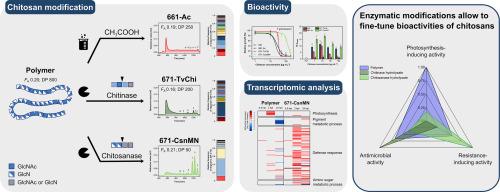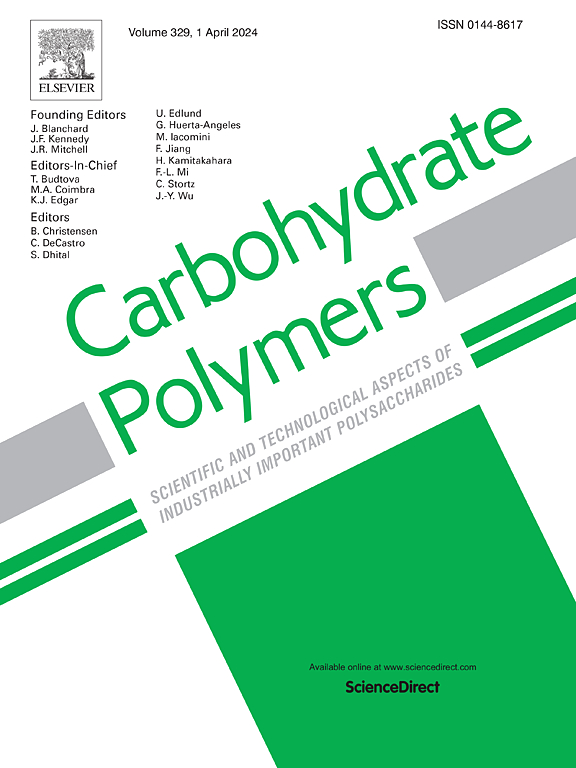Dissecting and optimizing bioactivities of chitosans by enzymatic modification
IF 12.5
1区 化学
Q1 CHEMISTRY, APPLIED
引用次数: 0
Abstract
Chitosans are versatile biopolymers with antimicrobial and plant-strengthening properties relevant to agriculture. However, a limited understanding of molecular structure-function relationships and cellular modes of action of chitosans hampers the development of effective chitosan-based agro-biologics. We partially hydrolyzed a chitosan polymer (degree of polymerization DP 800, fraction of acetylation FA 0.2) using acetic acid, a GH18 chitinase, or a GH8 chitosanase. All hydrolysates contained mixtures of chitosan oligomers and small polymers, but their composition in terms of DP, FA, and pattern of acetylation (PA) differed greatly. Importantly, chitinase products had mostly deacetylated residues at their ends, flanking mostly deacetylated residues, and vice versa for chitosanase products, while the products of acid hydrolysis had random PA. Acid hydrolysis did not significantly change antifungal and antibacterial activities. In contrast, chitinase hydrolysis slightly increased antibacterial, and chitosanase almost abolished antifungal activity. Elicitor and priming activities in the plant Arabidopsis were unchanged by acid, destroyed by chitinase, and increased by chitosanase hydrolysis. Transcriptomic analysis revealed that the chitosan polymer strongly induced genes involved in photosynthesis, while the chitosanase hydrolysate strongly induced genes involved in disease resistance. Clearly, different bioactivities require different chitosans, and enzymatic modification can fine-tune these activities as required for different agricultural products.

通过酶改性剖析和优化壳聚糖的生物活性
壳聚糖是一种多功能生物聚合物,具有与农业相关的抗菌和强化植物的特性。然而,由于对壳聚糖的分子结构-功能关系和细胞作用模式了解有限,阻碍了以壳聚糖为基础的有效农业生物制剂的开发。我们使用乙酸、GH18 壳聚糖酶或 GH8 壳聚糖酶部分水解了壳聚糖聚合物(聚合度 DP 800,乙酰化分数 FA 0.2)。所有水解物都含有壳聚糖低聚物和小聚合物的混合物,但它们在DP、FA和乙酰化模式(PA)方面的组成差异很大。重要的是,几丁质酶产物的末端大多是脱乙酰化残基,侧翼大多是脱乙酰化残基,壳聚糖酶产物则相反,而酸水解产物的 PA 则是随机的。酸水解并没有明显改变抗真菌和抗细菌活性。相比之下,几丁质酶水解产物的抗菌性略有增强,而壳聚糖酶则几乎取消了抗真菌活性。拟南芥的诱导剂和引诱剂活性在酸的作用下没有变化,在几丁质酶的作用下被破坏,而在壳聚糖酶的水解作用下则有所增加。转录组分析表明,壳聚糖聚合物能强烈诱导参与光合作用的基因,而壳聚糖酶水解物则能强烈诱导参与抗病的基因。显然,不同的生物活性需要不同的壳聚糖,而酶改性可以根据不同农产品的需要对这些活性进行微调。
本文章由计算机程序翻译,如有差异,请以英文原文为准。
求助全文
约1分钟内获得全文
求助全文
来源期刊

Carbohydrate Polymers
化学-高分子科学
CiteScore
22.40
自引率
8.00%
发文量
1286
审稿时长
47 days
期刊介绍:
Carbohydrate Polymers stands as a prominent journal in the glycoscience field, dedicated to exploring and harnessing the potential of polysaccharides with applications spanning bioenergy, bioplastics, biomaterials, biorefining, chemistry, drug delivery, food, health, nanotechnology, packaging, paper, pharmaceuticals, medicine, oil recovery, textiles, tissue engineering, wood, and various aspects of glycoscience.
The journal emphasizes the central role of well-characterized carbohydrate polymers, highlighting their significance as the primary focus rather than a peripheral topic. Each paper must prominently feature at least one named carbohydrate polymer, evident in both citation and title, with a commitment to innovative research that advances scientific knowledge.
 求助内容:
求助内容: 应助结果提醒方式:
应助结果提醒方式:


